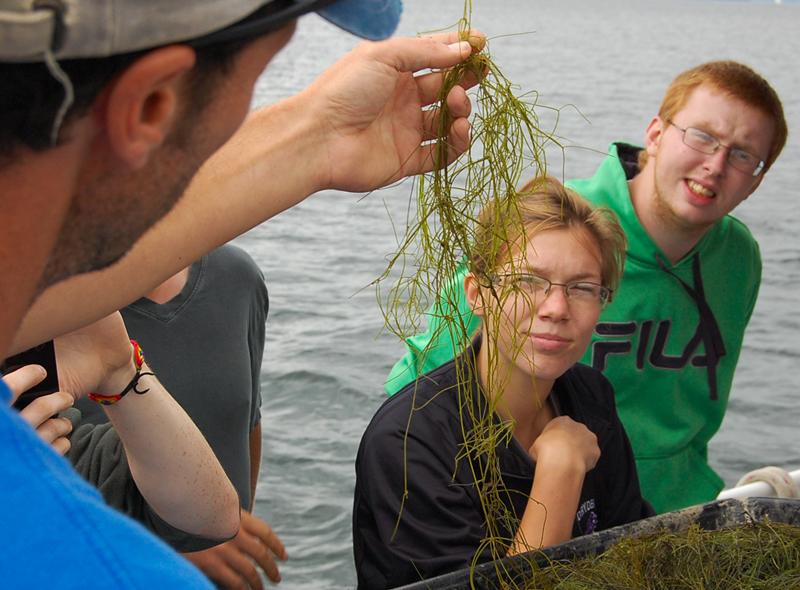One of the Floating Classroom’s high school interns was the first to discover hydrilla, an aquatic plant that is essentially a weed, while conducting research in Cayuga Lake in 2011. The Floating Classroom has since trained around 100 volunteers to analyze plant samples and create data surveys. Now, students can get involved by collecting plant and cataloging them with community volunteers in order to track the species.
“It’s science enrichment. We’re trying to create a relationship between people, students and their local environment,” said Bill Foster, program director of the Cayuga Lake Floating Classroom.
The Floating Classroom, Foster says, offers an average of 65 eco-cruises a year—engaging roughly 2,000 students in the area. They also work with local public schools and higher education institutions to supplement their curriculum.
“Studying ecology in the classroom doesn’t make sense when you have resources like this in the community,” said Kelly Wessell, Professor of Biology at Tompkins Cortland Community College. “It gets students to think about how ecologists do science and you just can’t get that in a classroom.”
Sophia D’Addario, a former student of Wessell and now an aquatic educator for the project, said a class field trip with the program helped to launch her career in local marine ecology.
“I’ve always been interested in aquatics,” said D’Addario. “I had the opportunity to come back for an ecology class to really get into the nitty gritty on the boat. That’s really what sparked my interest to want to stay on the boat and return and pass on knowledge.”
Wessell returned to the Floating Classroom with his Introduction to Biology class last week. They took a three hour experimental boat cruise and conducted three labs, which included water temperature profiles, clarity data and plankton surveys.
For the past four years, Wessell has brought numerous classes on the boat cruise because he sees the benefits from hands on educational opportunities with local experts on ecology.
“We learn by doing things. As interesting as a textbook can be, it doesn’t come close to matching this type of experience,” Wessell said.
His students also saw the value in direct and active learning.
“I enjoyed this a lot more than sitting in a lab. The more I enjoy something the more I want to learn and study it,” said Chris Sheperd, a freshman at Tompkins Cortland Community College.
Another major part of the organization is working with the classes to calculate a budget to offer affordable educational services. “If the group does not have the financial means or resources to fully fund the projects, the Floating Classroom tries to provide scholarships and funding to cover the costs,” Foster said.
Cory Van Nederyner, an aquatics educator on the boat, said that grassroots style educational programs like this can make a big difference for students.
“Where schools themselves are already tapped out with time and resources (outside assistance and scholarships) open up the educational spectrum and provide access to different avenues for schools,” Van Nederyner said.
The Floating Classroom staff and Wessell hope that experiences like this will spark interest in sciences and gives students hands on learning opportunities.
“I think that we tend to do what is done to us as students. Teachers often follow the lead of their former teachers. So by getting students out here, maybe they will take their future students out and get them out of the classroom,” Wessell said.







